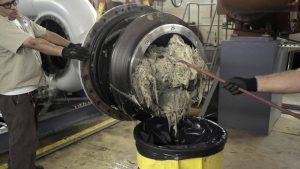
With so many staying at home, no one needs their sewer main blocked.
The Pennsylvania Department of Environmental Protection (DEP) warned recently that residents should only flush toilet paper and human waste, and not disinfecting wipes or other non-flushable items that should be thrown away.
DEP officials said there has been an increase in reports of sewage treatment facilities dealing with non-flushable materials clogging filters and their equipment since the beginning of the COVID-19 stay-at-home orders in March.
“Flushing things that aren’t meant to be flushed can damage your own sewer pipes as well as the sewer treatment facilities that we all depend on,” said DEP Secretary Patrick McDonnell. “Even so-called ‘flushable’ wipes shouldn’t be put in the toilet.”
The state DEP noted that tissues, paper towels, and single-use wipes, including cleansing and diaper wipes, cannot be safely flushed, even if they are labeled as “flushable” or “biodegradable.” Other non-flushable include things like diapers, feminine hygiene products, disposable toilet brushes, disposable gloves, cotton swabs, dental floss, and kitty litter.
A 2019 issue of Keystone Quality Manager magazine said that many disposable wipes are made from plastics and regenerated cellulose fibers. Many baby wipes – despite being soft and feeling like fabric – are really made with plastics.
Many so-called flushable wipes don’t break down like toilet paper and can clog systems very quickly. Many sewer blockages occur between a house or business and the sewer main, where the property owner is responsible for correcting and paying for the repair.
In addition, blockages can cause sewage overflows, which are never good and can harm local waterways.
State DEP officials also urged residents to trash food scraps, grease, fat, or oil and don’t put them down the drain.
For years, sewage workers have struggled with “fatburgs” and other problems caused by grease, fat, and oil solidifying and sticking to the insides of the pipes that carry wastewater from homes and businesses to the wastewater treatment plant.
State DEP officials have a simple message: look out for your neighbors and do your best to prevent sewer backups.








